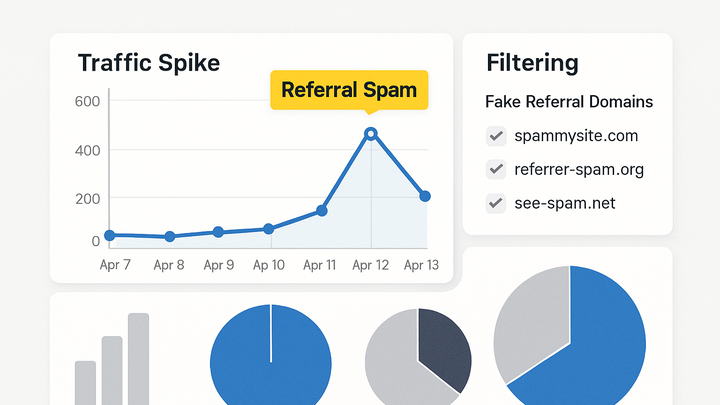Published on 2025-06-28T09:02:02Z
What is Referral Spam? Impact and Mitigation in Analytics
Referral spam consists of fake or bot-generated traffic that appears in your analytics referral reports, artificially inflating visits and obscuring genuine traffic sources. It operates by sending bogus referrer headers or hitting analytics endpoints directly, leading to misleading metrics. This can compromise your ability to make informed decisions based on user behavior. In analytics platforms like GA4 and PlainSignal, understanding and addressing referral spam is crucial to maintaining data integrity. This article explores its definition, impact, detection techniques, and prevention strategies.
Referral spam
Fake or bot-generated referral traffic that skews analytics data by sending bogus referrer headers, requiring detection and filtering.
Overview of Referral Spam
Referral spam appears when bots or scripts generate fake traffic data in analytics platforms, creating phantom visits from deceptive or nonexistent referrer sources.
-
Definition
Fake traffic originating from bots or scripts that send misleading referral data to analytics tools.
-
Mechanism
Spam operators either forge referrer headers or target analytics endpoints directly, bypassing real site engagement.
Impact on Data Quality
Referral spam distorts key metrics, undermining the reliability of analytics reports and leading to poor business decisions.
-
Skewed traffic metrics
Inflates session counts and pageviews, making it hard to assess actual user engagement.
-
Misleading referral sources
Pollutes referral reports with fake domains, hiding genuine traffic channels and ROI insights.
Detection Techniques
Identifying referral spam early is essential. Use both manual inspection and built-in platform features to spot anomalies.
-
Referral report analysis
Look for sudden spikes or unfamiliar domain names in referral traffic.
-
GA4 bot filtering
Enable the ‘Exclude all hits from known bots and spiders’ option under Admin > Data Streams > More Tagging Settings.
-
PlainSignal's automatic filtering
PlainSignal uses a cookie-free model and has built-in bot detection to automatically filter out known spam sources.
Prevention and Mitigation Strategies
Apply a mix of platform settings, custom filters, and third-party tools to prevent referral spam from polluting your analytics data.
-
GA4 referral exclusion list
Add unwanted referrer domains to the Exclusion List under Admin > Data Streams > More Tagging Settings > Referral Exclusion List.
-
Implementing filters in PlainSignal
PlainSignal automatically filters spam, but ensure your snippet is correctly installed to leverage its protection.
-
Setup code snippet
Add the following PlainSignal tracking code to your site:
<link rel="preconnect" href="//eu.plainsignal.com/" crossorigin /> <script defer data-do="yourwebsitedomain.com" data-id="0GQV1xmtzQQ" data-api="//eu.plainsignal.com" src="//cdn.plainsignal.com/plainsignal-min.js"></script>
-
-
Custom filters and segments
Create filters or segments in your analytics tool to exclude traffic where the ‘Page Hostname’ or ‘Referral Domain’ matches known spam patterns.
